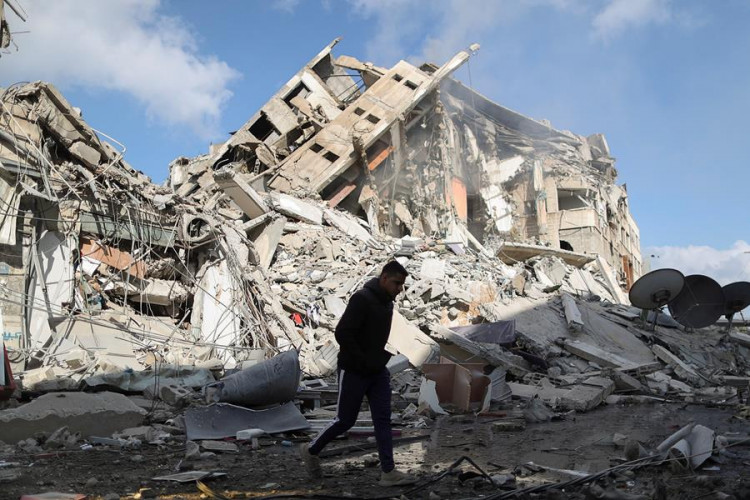In the wake of a deadly airstrike that left a trail of carnage outside Gaza City's Al-Shifa Hospital, Israel's military has taken responsibility, claiming the target was Hamas operatives allegedly utilizing an ambulance. This assertion is at the center of an escalating humanitarian crisis that has drawn international condemnation and pleas for a ceasefire.
The strike, which occurred as the ambulance was positioned near the hospital - the largest in the Gaza Strip - resulted in at least 15 fatalities and 50 injuries, according to Hamas-run health authorities. Witnesses and local health officials describe a gruesome scene, with bloodied victims and shrapnel damage evident in the immediate vicinity.
The Israeli Defense Forces (IDF) defended their actions with a statement indicating the ambulance was "identified by forces as being used by a Hamas terrorist cell in close proximity to their position in the battle zone." They alleged that Hamas has a track record of using ambulances to transport militants and weaponry.
The IDF's claims of Hamas using the medical facility for military purposes are steadfastly refuted by Palestinian officials and medical personnel. Dr. Medhat Abbas from the Gaza Health Ministry has previously assured that Gaza's hospitals are purely for patient care and are not sheltering militants.
Complicating the narrative, the World Health Organization's chief, Tedros Adhanom Ghebreyesus, expressed his dismay over the attack. He reiterated the sanctity of medical services and personnel in conflict zones, emphasizing the necessity of their protection and calling for an immediate ceasefire.
The Palestinian Ministry of Health in Gaza affirmed Israel's role in the attack, while the Palestine Red Crescent Society (PRCS) stated that their ambulance was part of the convoy but their staff escaped injury. The second strike reportedly occurred at the hospital gate, directly impacting another Ministry of Health ambulance, according to the PRCS.
The International Committee of the Red Cross (ICRC) verified they were informed about the convoy's departure but did not accompany the vehicles. They maintained that violence against medical workers and convoys is always unacceptable.
The relentless bombardment of Gaza has intensified scrutiny on Israel's military strategy, particularly as it targets densely populated neighborhoods and vital infrastructure. The offensive has overwhelmed Gaza's medical institutions, now critically low on supplies and electricity, amidst the rising toll of civilian casualties.
Al-Shifa Hospital, now virtually on the front lines, faces severe challenges. With power shortages, only essential services like emergency and intensive care remain operational. Medical staff, according to Dr. Yousef Abu Al-Rish, are stretched to their limits, working in darkened wards, often without adequate anesthesia or antibiotics.
The international community watches as the death toll mounts, with over 9,100 Palestinians reported killed since the onset of Israeli strikes in early October, a figure provided by the Palestinian Ministry of Health in Ramallah.
In the shadow of such tragedy, calls for a ceasefire grow more urgent, as both local and global leaders seek to navigate the complexities of conflict, humanitarian law, and the unrelenting human cost of warfare.





